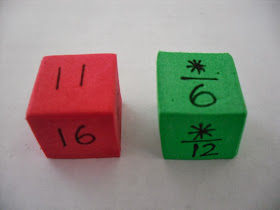My main goal is to provide you with some alternative ways to make Math manipulatives without breaking your budget, as well as some interactive activities for using your new hand-made manipulatives.
So, another week, another idea. Here is another way I use "do-it-yourself" dice in my Math classroom...
DIY Dice - Idea #2
Fraction Dice
As I have said before, the thing I love most about
using these dice is it allows for easy differentiation. These activities allow students to develop their understanding at their own rate, thus becoming more confident learners. Each set of dice can be
slightly different to accommodate each student's abilities. One group could be
working with unit fractions, one with fractions with common denominators, one
with mixed numbers, etc.
I also love that the possibilities with these dice are endless. Here are a few ways to create your fraction dice.
I also love that the possibilities with these dice are endless. Here are a few ways to create your fraction dice.
1.
Unit Fraction dice – All fractions on these dice will have a
numerator of one. You can choose which denominators you want to include. I
usually stick to 2 main groupings. Either, 1/2,
1/3, 1/4, 1/5, 1/6, and 1/7 or 1/2, 1/3, 1/4, 1/6, 1/8, and 1/12.
Depending on what level your students are, you may want to only include 3
different fractions per die; therefore each fraction will appear twice on each
die. I.e. 1/2, 1/3, 1/4, 1/2, 1/3, 1/4.
2.
“Most commonly used
fractions” dice – Randomly select commonly used fractions to put on each face of
the die. Use any of the following 1/2, 1/4, 3/4, 1/5, 2/5, 1/10, 1/3, or 2/3.
3.
Numerator and denominator
dice – I
use these most often as I find they provide the most variety in terms of
fractions rolled. Students will roll two dice to determine their fraction. One
die represents the numerator (the whole number), and the other the denominator.
There are multiple ways to use these dice.
a.
Proper fractions – create proper fractions by keeping the whole
number low, I use the digits 1, 2, and 3 twice on one die, and you can choose
the denominators based on your students’ abilities. The only time they might
get an improper fraction is if they roll a 3 and a */2. If they are capable of
working with it great, if not, simply get them to roll again.
b.
Improper Fractions – create improper
fractions using higher single digits, or double digit numbers for the numerator
die.
c.
Common denominators – When completing any adding and
subtracting activities (or ordering), you will need to decide whether your
students will work with common denominators or not. If you want your students
to work with common denominators simply tell them to roll the denominator die
once, and the numerator die twice (or more).
4.
Mixed numbers Dice – create mixed numbers by
rolling a single digit number die with a die option from either #1 or #2 above.
Here is a sample activity and a sample game I do with fraction dice.
You can find the whole collection of activities and games using DIY Fraction Dice here. There are over 15 activities and printables included in the pack!
Stay tuned for another way I use DIY dice next week!









Loving these posts on DIY dice! Keep them coming:)
ReplyDeleteTara
The Math Maniac